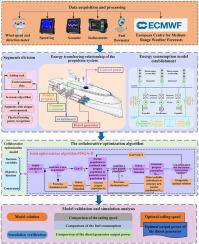A novel cooperative optimization method of speed and power allocation for the fully rotational electric propulsion ship
IF 10
1区 环境科学与生态学
Q1 ENGINEERING, ENVIRONMENTAL
引用次数: 0
Abstract
Energy consumption optimization for the fully rotational electric propulsion ship is crucial for energy saving and emission reduction, and hence achieving the low-carbon development of the shipping industry. However, there is currently a lack of effective energy consumption models and cooperative optimization methods for fully rotational electric propulsion ships, which limits improvements in the ship energy efficiency. Therefore, a method for the cooperative optimization of sailing speed and power allocation considering changes in sea conditions is proposed. Firstly, a nonlinear optimization model for ship energy consumption considering time-varying sea conditions is established. Then, a cooperative optimization model for the sailing speed and power allocation is established to achieve the minimum ship energy consumption. In addition, the NSGA-II optimization algorithm is adopted to achieve the cooperative optimization of the sailing speed and power allocation for the fully rotational electric propulsion ship. Finally, a case study is carried out to validate the effectiveness of the proposed method. The results indicate that the energy consumption and emissions of the fully rotational electric propulsion ship can be reduced by 4.17 % through adopting the proposed cooperative optimization method. In addition, the comparison analysis results show that the NSGA-II algorithm achieves better energy savings than the Differential Evolutionary (DE), Particle Swarm Optimization (PSO) and Genetic Algorithm (GA). Therefore, the NSGA-II algorithm has its superiority over other algorithms for the energy consumption optimization of the fully rotational electric propulsion ship.

全旋转电力推进船舶航速与功率分配的一种新型协同优化方法
全旋转电力推进船舶的能耗优化是实现船舶节能减排,实现航运业低碳发展的关键。然而,目前缺乏有效的全旋转电力推进船舶能耗模型和协同优化方法,限制了船舶能效的提高。为此,提出了一种考虑海况变化的航速与动力分配协同优化方法。首先,建立了考虑时变海况的船舶能耗非线性优化模型。然后,以船舶能耗最小为目标,建立了航速与动力分配的协同优化模型。此外,采用NSGA-II优化算法,实现了全旋转电推进船舶航速与动力分配的协同优化。最后,通过实例分析验证了所提方法的有效性。结果表明,采用所提出的协同优化方法,全旋转电力推进船舶的能耗和排放可降低4.17%。此外,对比分析结果表明,NSGA-II算法比差分进化(DE)、粒子群优化(PSO)和遗传算法(GA)具有更好的节能效果。因此,对于全旋转电力推进船舶的能耗优化,NSGA-II算法比其他算法有其优越性。
本文章由计算机程序翻译,如有差异,请以英文原文为准。
求助全文
约1分钟内获得全文
求助全文
来源期刊

Journal of Cleaner Production
环境科学-工程:环境
CiteScore
20.40
自引率
9.00%
发文量
4720
审稿时长
111 days
期刊介绍:
The Journal of Cleaner Production is an international, transdisciplinary journal that addresses and discusses theoretical and practical Cleaner Production, Environmental, and Sustainability issues. It aims to help societies become more sustainable by focusing on the concept of 'Cleaner Production', which aims at preventing waste production and increasing efficiencies in energy, water, resources, and human capital use. The journal serves as a platform for corporations, governments, education institutions, regions, and societies to engage in discussions and research related to Cleaner Production, environmental, and sustainability practices.
 求助内容:
求助内容: 应助结果提醒方式:
应助结果提醒方式:


